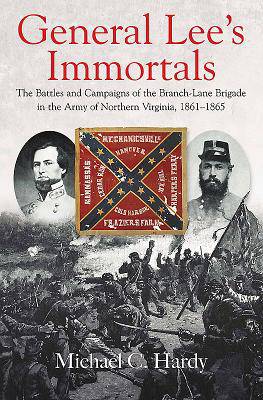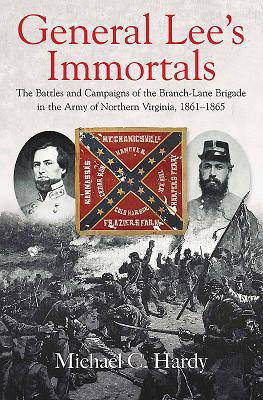
- Retrait gratuit dans votre magasin Club
- 7.000.000 titres dans notre catalogue
- Payer en toute sécurité
- Toujours un magasin près de chez vous
- Retrait gratuit dans votre magasin Club
- 7.000.0000 titres dans notre catalogue
- Payer en toute sécurité
- Toujours un magasin près de chez vous
General Lee's Immortals
The Battles and Campaigns of the Branch-Lane Brigade in the Army of Northern Virginia, 1861-1865
Michael Hardy
Livre broché | Anglais
20,45 €
+ 40 points
Description
Finalist, 2018, Unit History, Army Historical Foundation Distinguished Book Award
Winner, 2018, Dr. James I. Robertson Jr. Literary Prize, Robert E. Lee Civil War Library and Research Center
Two decades after the end of the Civil War, former Confederate officer Riddick Gatlin, Jr. bemoaned the lack of a history of the Branch-Lane Brigade, a command in which he had served. "Who has ever written a line to tell of the sacrifices, the suffering and the ending of these more than immortal men?" he asked. "Why has the history of that brigade not been written?" With the publication of General Lee's Immortals: The Battles and Campaigns of the Branch-Lane Brigade in the Army of Northern Virginia, 1861-1865, Gatlin's long wait is finally over.
This storied brigade was first led by Lawrence Branch, and then by James H. Lane, and served with Lee's Army of Northern Virginia for its entire existence. These Tar Heels fought in nearly every major battle in t he Easter n Theater, including the Seven Days' Battles, Second Manassas, Sharpsburg (where Branch was killed), Fredericksburg, Chancellorsville ( where its members mistakenly shot Stonewall Jackson), Gettysburg (including Pickett's Charge), the Wilderness, Spotsylvania, North Anna, Cold Harbor, the Petersburg Campaign, and the final retreat to Appomattox.
Originally part of A. P. Hill's famous "Light Division," the brigade earned high plaudits for it s disciplined defensive efforts, hard -hitting attacks, and incredible marching abilities. Its heavy combat exposure, however, resulted in devastating losses. By war's end, its roll call of casualties far exceeded its number of survivors.
Michael Hardy's General Lee's Immortals is based upon years of study and grounded on an impressive foundation of sources, which allows the men to speak for themselves as they describe their time in camp, endless hardships, long marches, bloody battles, increasing hunger, and much more. In addition to a dozen original maps, General Lee's Immortals also includes scores of rare photos--many of which were previously unpublished--all of which enhance this well written and engrossing account.
Although it took more than 150 years, Captain Gatlin's "more than immortal men" have finally received their just due in this, their first comprehensive history.
Winner, 2018, Dr. James I. Robertson Jr. Literary Prize, Robert E. Lee Civil War Library and Research Center
Two decades after the end of the Civil War, former Confederate officer Riddick Gatlin, Jr. bemoaned the lack of a history of the Branch-Lane Brigade, a command in which he had served. "Who has ever written a line to tell of the sacrifices, the suffering and the ending of these more than immortal men?" he asked. "Why has the history of that brigade not been written?" With the publication of General Lee's Immortals: The Battles and Campaigns of the Branch-Lane Brigade in the Army of Northern Virginia, 1861-1865, Gatlin's long wait is finally over.
This storied brigade was first led by Lawrence Branch, and then by James H. Lane, and served with Lee's Army of Northern Virginia for its entire existence. These Tar Heels fought in nearly every major battle in t he Easter n Theater, including the Seven Days' Battles, Second Manassas, Sharpsburg (where Branch was killed), Fredericksburg, Chancellorsville ( where its members mistakenly shot Stonewall Jackson), Gettysburg (including Pickett's Charge), the Wilderness, Spotsylvania, North Anna, Cold Harbor, the Petersburg Campaign, and the final retreat to Appomattox.
Originally part of A. P. Hill's famous "Light Division," the brigade earned high plaudits for it s disciplined defensive efforts, hard -hitting attacks, and incredible marching abilities. Its heavy combat exposure, however, resulted in devastating losses. By war's end, its roll call of casualties far exceeded its number of survivors.
Michael Hardy's General Lee's Immortals is based upon years of study and grounded on an impressive foundation of sources, which allows the men to speak for themselves as they describe their time in camp, endless hardships, long marches, bloody battles, increasing hunger, and much more. In addition to a dozen original maps, General Lee's Immortals also includes scores of rare photos--many of which were previously unpublished--all of which enhance this well written and engrossing account.
Although it took more than 150 years, Captain Gatlin's "more than immortal men" have finally received their just due in this, their first comprehensive history.
Spécifications
Parties prenantes
- Auteur(s) :
- Editeur:
Contenu
- Nombre de pages :
- 408
- Langue:
- Anglais
Caractéristiques
- EAN:
- 9781611214482
- Date de parution :
- 13-08-18
- Format:
- Livre broché
- Format numérique:
- Trade paperback (VS)
- Dimensions :
- 152 mm x 229 mm
- Poids :
- 544 g

Les avis
Nous publions uniquement les avis qui respectent les conditions requises. Consultez nos conditions pour les avis.






